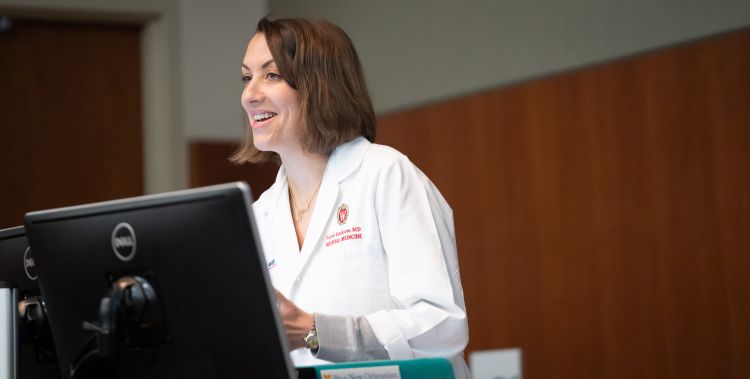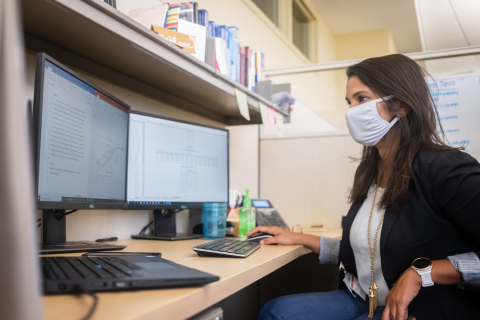Experience at the table: Department of Medicine Diversity, Equity and Inclusion Task Force members share previous efforts

“I completed the Health Equity Leadership Scholars program. I also have an ICTR grant to study the impact of incarceration on cancer outcomes in Wisconsin, present lectures around the health care of immigrants and refugees in Wisconsin and sit on the Graduate Medical Education Diversity, Equity, and Inclusion committee.” —Farah Kaiksow, MD, MPP
“I’ve been an active member of formal minority groups/task forces: minority pre-med groups and Black associations as an undergraduate student, the Duke University Medical School Admissions Committees as a medical student, and local and national minority associations as a professional.” —Lisa Jones, MD
“I have had several opportunities through my education leadership roles to develop and disseminate skills related to health disparities, diversity, equity, and inclusion.” —Shobhina Chheda, MD, MPH
Participation in leadership programs, membership in minority task forces and associations, community activism and lived experience are just some examples of the expertise found among the members of the University of Wisconsin Department of Medicine’s Diversity, Equity and Inclusion (DEI) Task Force.
Established in July 2020 and chaired by Narjust Duma, MD, assistant professor, Hematology, Medical Oncology and Palliative Care, the task force identifies DEI priorities and best practices, and will soon share recommendations to spur change department-wide.
Continuing a previous Vital Signs article, we share the experience and expertise that task force members have to offer.
Have questions or experiences you would like to discuss? Please reach out to Dr. Duma or any of the task force members directly.

Above, Dr. Wajiha Akhtar
“Over the past three years, I have served as the chair of the Board of Directors for a national nonprofit organization, HEART: Women and Girls. HEART educates and advises on sexual health, violence, and abuse among Muslim communities. We have worked to dismantle structural racism that has long decreased access to essential services to Muslims in need. Additionally, I was just appointed as a member of the Board of Directors of One City Schools, a 4k to sixth-grade charter school in Madison. One City is working to ensure that young children of color are on track to be at the same educational level as their non-POC peers. This work has enabled me to understand some of the grave structural inequities in our communities, and be on the forefront in coming up with solutions to help dismantle the current education system.”
Wajiha Akhtar, MPH, PhD, assistant scientist, Infectious Disease

Above, Dr. Shobhina Chheda
“For almost 20 years, my clinical practice has focused on general internal medicine and women’s health. With my colleagues, I have seen and cared for women who have experienced bias within healthcare systems based on gender and its intersection with race/ethnicity and sexual orientation. I have had several opportunities through my education leadership roles to develop and disseminate skills related to health disparities, diversity, equity, and inclusion. This includes serving as the director of the diversity curriculum for medical students and participating as an implementer of the Breaking the Bias Habit workshop for Bias Reduction in Internal Medicine (BRIM). I am the principal investigator on a Wisconsin Partnership Program grant: Transforming Medical Education 2019-2022: Re-envisioning Curriculum, Technology, and New Programs through a Health Equity Lens.”
Shobhina Chheda, MD, MPH, professor, General Internal Medicine; associate dean for medical education, UW School of Medicine and Public Health

Above, Dr. Briana Jelenc
“I am a general internist who sees the effects of racism in my practice and workplace regularly. I am not afraid to stand up and make my voice heard to help make difficult changes to our system. I work well on a team collaborating and communicating with others, and I enjoy fostering a positive and forward-thinking environment for others. I’m the daughter and granddaughter of Lutheran pastors and my dad and grandfather instilled in me compassion for others and the strong desire to fight for injustice on peaceful terms.”
Briana Jelenc, MD, clinical assistant professor, General Internal Medicine

Above, Dr. Lisa Jones (on right) pictured with nurse practitioner Elizabeth Holden, NP
“I developed an interest in serving underserved populations at a young age. As a woman of color, it is impossible to escape racism and sexism. Those experiences often lead us to mentor students, join advocacy groups and organizations and participate in recruitment processes. In many ways, these personal experiences have driven a passion for solving seemingly unsolvable problems. My clinical work, while not directly focused on minority, disabled, or LGBTQIA populations, serves an underserved group of patients in gastroenterology: those with pelvic floor and anorectal problems. I developed a specific clinic to addresses these issues at Marshfield Clinic. I was recruited here as our division’s medical director of pelvic floor and anorectal disorders to continue this work.”
“I have witnessed firsthand how recruitment strategies can directly impact interest and ultimately retention. Throughout my formative years and my career, I’ve been an active member of formal minority groups/task forces: minority pre-med groups and Black associations as an undergraduate student, the Duke University Medical School Admissions Committees as a medical student, and local and national minority associations as a professional.”
Lisa Jones, MD, MPH, MMCI, assistant professor, Gastroenterology and Hepatology
![]()
“In 2019, I completed the Health Equity Leadership Scholars program, a joint project of the UW Institute for Clinical and Translational Research (ICTR) Collaborative Center for Health Equity and the University of Maryland School of Public Health Center for Health Equity. I also have an ICTR grant to study the impact of incarceration on cancer outcomes in Wisconsin. As a faculty member for the Internal Medicine Residency Global Health Pathway, I present lectures around the health care of immigrants and refugees in Wisconsin. I sit on the Graduate Medical Education Diversity, Equity, and Inclusion committee, as well.”
Farah Kaiksow, MD, MPP, assistant professor, Hospital Medicine
Banner: Dr. Farah Kaiksow, pictured at a Department of Medicine Research Day, is a member of our Diversity, Equity and Inclusion (DEI) task force. Credit: Clint Thayer/Department of Medicine.